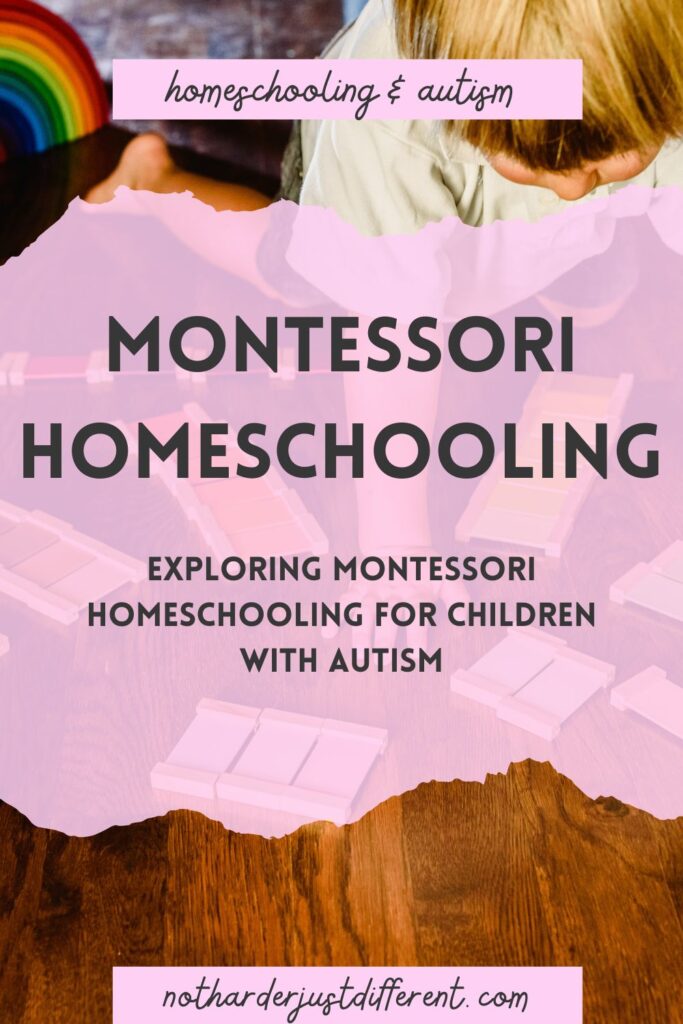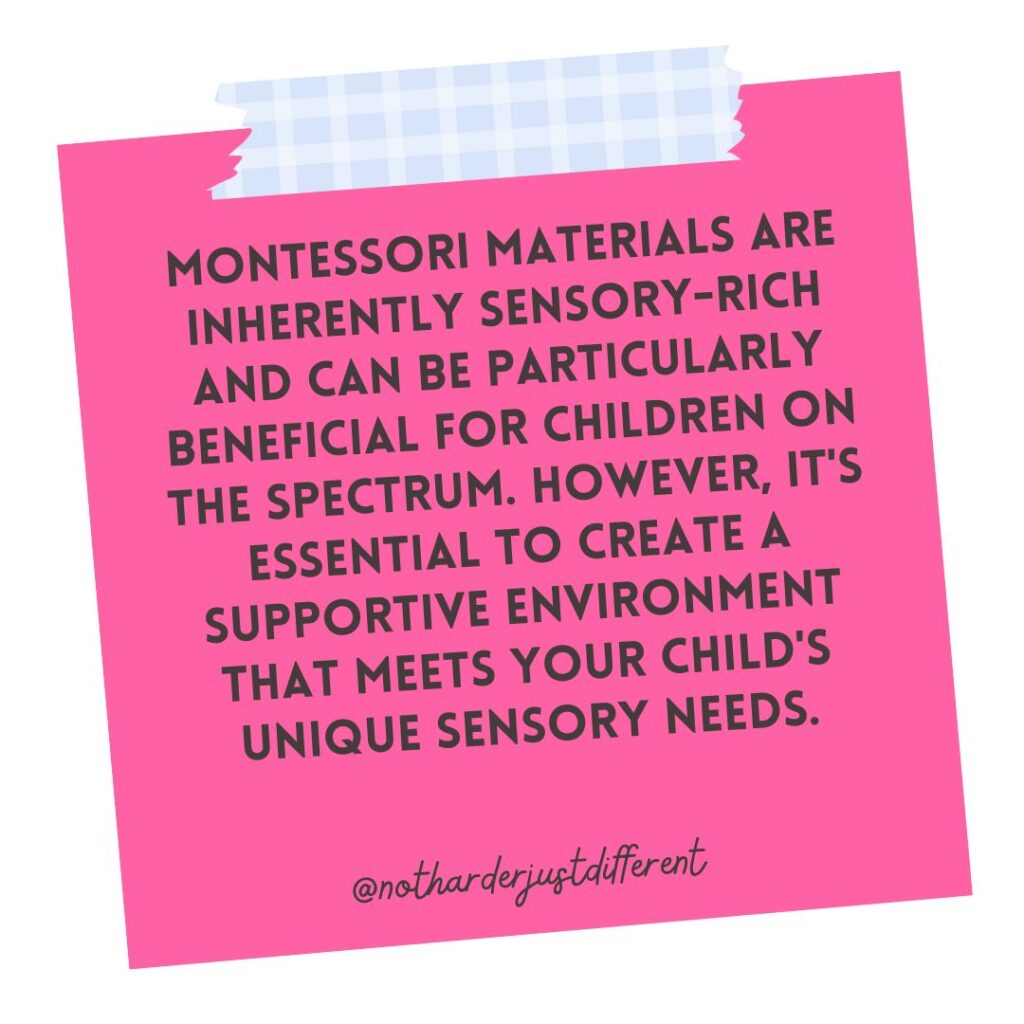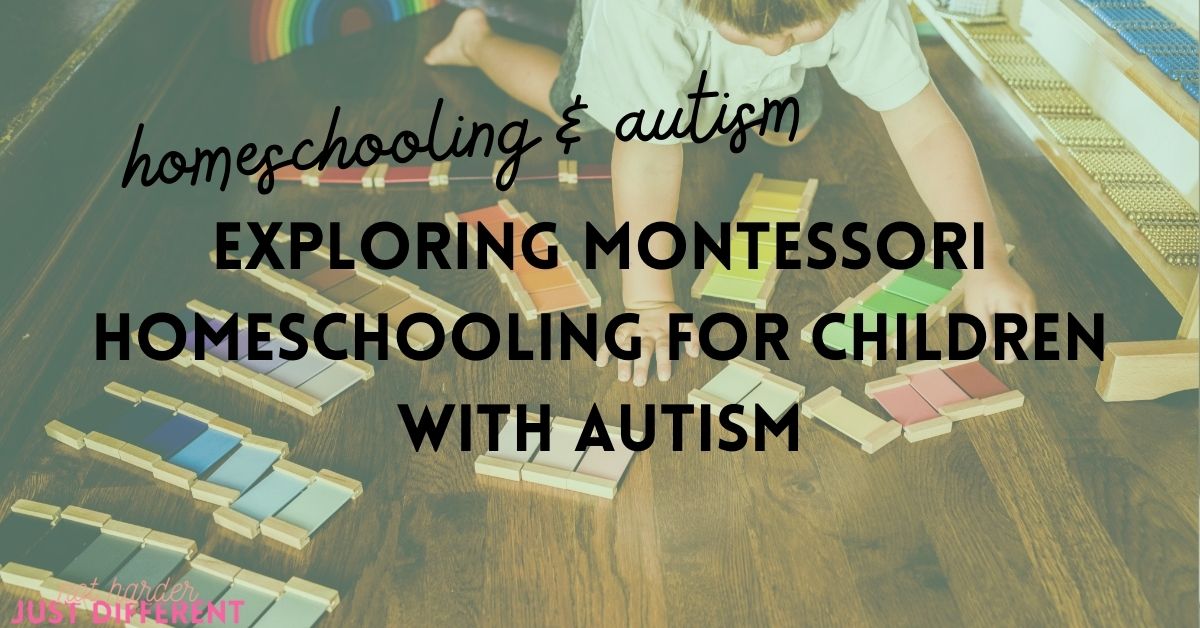Disclaimer: As a future Licensed Clinical Social Worker (LCSW) currently pursuing my master’s degree, I am passionate about sharing insights and information related to parenting, autism and homeschooling based on my personal experiences and research. However, the content shared on this blog is not intended to substitute professional advice, diagnosis, or treatment. Parenting is a deeply personal journey, and while I strive to provide valuable insights, every family and situation is unique. Readers are encouraged to consult with qualified professionals for personalized guidance tailored to their specific needs and circumstances.
Let’s chat about Montessori homeschooling, specially using it with our incredible kiddos on the autism spectrum. Get ready for a journey filled with hands-on learning, exploration, and discovery!
Imagine a homeschooling environment where your child takes the lead, exploring their interests at their own pace. That’s the beauty of the Montessori method—a child-centered approach that honors each child’s unique abilities and learning style.
I incorporate a lot of Montessori methods into our daily life, not just homeschooling. This is definitely one of those methods that leaks into your whole life, not just school. There is so much that I love about Montessori methods. I think in another life, Bug would have gone to a Montessori preschool, because I believe in a lot of the methods here.
Like with any method, you get to choose what to take and what to leave! We aren’t completely Montessori homeschoolers, and blend a lot of methods together to work best for Bug, but I think there is a lot to learn from the Montessori method. Let’s talk about the basics and how you can add it to your life, if you want!

Exploring Montessori Homeschooling
Understanding Montessori Homeschooling
Montessori education is all about empowering children to be independent, self-directed learners. Developed by Dr. Maria Montessori, this approach emphasizes hands-on, experiential learning in a carefully prepared environment. Children engage in purposeful activities that foster concentration, creativity, and critical thinking skills.
In a Montessori homeschool, your child has the freedom to choose activities that capture their interest and curiosity. Whether it’s working with sensorial materials, exploring nature, or engaging in practical life skills, the Montessori method encourages children to follow their passions and take ownership of their learning journey.
Why Montessori Homeschooling Works Well for Children with Autism
Montessori homeschooling offers a range of features that are particularly well-suited to children with autism:
- Individualized and Child-Centered Learning: Montessori education is inherently individualized and child-centered, allowing children to progress at their own pace and according to their unique interests and abilities. For children with autism, who may have diverse learning styles and preferences, the flexibility of the Montessori approach ensures that their educational needs are met in a supportive and nurturing environment.
- Hands-On and Sensorial Learning: Montessori education emphasizes hands-on, experiential learning experiences that engage the senses and promote exploration and discovery. Children with autism often have heightened sensory sensitivities and benefit from sensory-rich learning environments. The tactile materials and multisensory activities used in Montessori homeschooling provide opportunities for sensory integration and skill development in a structured and supportive context.
- Structured and Predictable Environment: Montessori classrooms are carefully prepared environments designed to promote independence, order, and self-regulation. For children with autism, who may thrive in structured and predictable environments, the consistency and organization of the Montessori environment can provide a sense of security and stability. The clear expectations and routines inherent in Montessori homeschooling help children with autism feel confident and empowered in their learning journey.
- Focus on Practical Life Skills and Independence: Montessori education places a strong emphasis on practical life skills and activities that promote independence and self-sufficiency. Children with autism often benefit from explicit instruction and practice in daily living skills, such as dressing, cooking, and cleaning. The practical life activities in Montessori homeschooling provide valuable opportunities for children to develop essential life skills in a purposeful and meaningful context.
- Promotion of Social Skills and Peer Interaction: Montessori education encourages collaboration, cooperation, and peer interaction in a supportive and inclusive environment. Children with autism may face challenges in social communication and interaction, and the social learning opportunities provided in Montessori homeschooling can help them develop essential social skills and build positive relationships with their peers.
- Respect for the Child’s Autonomy and Agency: Montessori education respects the child’s autonomy and agency, allowing them to take ownership of their learning and make choices based on their interests and preferences. For children with autism, who may have a strong need for control and autonomy, the freedom and independence afforded in Montessori homeschooling can foster a sense of empowerment and self-confidence.

Tailoring Montessori for Autism
Adapting the Montessori approach for children with autism requires thoughtful consideration and flexibility. Montessori materials are inherently sensory-rich and can be particularly beneficial for children on the spectrum. However, it’s essential to create a supportive environment that meets your child’s unique sensory needs.
Provide clear visual cues and structure to help your child navigate their learning environment. Organize materials in a way that promotes independence and encourages exploration. Consider incorporating sensory-friendly elements such as soft lighting, calming colors, and comfortable seating options.
Practical Tips and Strategies
Let’s get down to the nitty-gritty of Montessori homeschooling! Start by creating a Montessori-inspired learning space that invites your child to explore and discover. Arrange materials on low shelves within easy reach, allowing your child to independently select activities that pique their interest.
Focus on activities that promote hands-on exploration and sensorial experiences. Montessori materials like the pink tower, knobbed cylinders, and sandpaper letters provide opportunities for tactile exploration and fine motor development. Encourage your child to engage in practical life skills such as pouring, sweeping, and food preparation, fostering independence and self-confidence.
Establish a daily routine that includes ample time for exploration, play, and quiet reflection. Embrace the principle of “follow the child,” allowing your child’s interests and curiosity to guide the learning process. Be patient and flexible, recognizing that each child develops at their own pace and in their own unique way.
Embracing the Montessori Philosophy
At the heart of the Montessori philosophy lies a deep respect for the child as an individual with limitless potential. Montessori homeschooling celebrates each child’s unique strengths and interests, fostering a love for learning that lasts a lifetime.
Encourage your child to follow their passions and explore the world around them with wonder and curiosity. Embrace the principles of independence, freedom within limits, and respect for the child’s natural development. You and your child can go on a journey of discovery and growth, nurturing the extraordinary potential within our children with autism through the magic of Montessori homeschooling!

